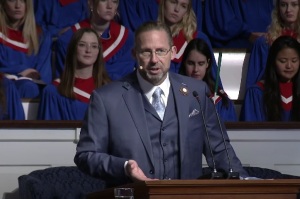Wiccans File Lawsuit Against New Mexico City Over Ten Commandments Display
Followers of Wicca are suing a New Mexico city for having a Ten Commandments display on their government property.
A court recently heard the suit of Jane Felix and B.N. Coone against the city of Bloomfield in the United States District Court for the District of New Mexico.
Felix and Coone are being represented by the state chapter of the ACLU, and call the display a "violation of civil rights."
"The placement of the city's Ten Commandments monument by defendants amounts to their endorsement of a particular religion in violation of the Establishment Clause of the First Amendment to the United States Constitution," reads the suit in part.
"Because the Ten Commandments monument is displayed at such a prominent location, Plaintiffs are brought into direct and unwelcome personal contact with it or plaintiffs must alter their behavior to avoid contact with the monument."
Ryan Lane, city attorney for Bloomfield, told The Christian Post about the background of the Ten Commandments display.
"The Ten Commandments historical monument was erected on the city of Bloomfield City Hall lawn on July 4, 2011, by a group of private citizens," said Lane.
"I believe the private citizens' stated purpose was to recognize the significance of the Ten Commandments in our nation's history."
Known as Felix v. City of Bloomfield, according to Lane "the trial on the merits has been completed and the court is taking the matter under advisement."
Bloomfield is receiving legal assistance from the Alliance Defending Freedom, a Washington, D.C.-based conservative law firm.
The ACLU filed the lawsuit in February 2012 in behalf of the Wiccans, with ACLU-NM Executive Director Peter Simonson stating he had no problem with Ten Commandments displays off of government property.
"Individuals, religious communities and religious associations should be free to post the Ten Commandments as they wish, and the ACLU will defend their right to do so," said Simonson in 2012.
"But the government should not decide which religious doctrines it favors and then post them on government property. Government should stay out of the business of religion and avoid choosing some religious beliefs over others."
When asked about the merit of the complaint against the Ten Commandments, Bloomfield attorney Lane told CP that "I am not aware of a separation of church and state provision in the U.S. Constitution."
"The city's stance with regard to plaintiffs' claim is that the city has passed a policy that created a forum on its City Hall lawn allowing private citizens to erect historical monuments on the City Hall lawn," said Lane.
"Private citizens have thus far chosen to erect three historical monuments on the City Hall lawn pursuant to this policy: Ten Commandments monument, Declaration of Independence monument and Gettysburg Address monument. As such, the Ten Commandments historical monument is the speech of the private citizens who erected the monument and not the city of Bloomfield."





























